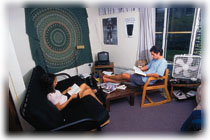Main Menu · Search ·Current Issue ·Contact ·Archives ·Centennial ·Letters to the Editor ·FAQs
  |
Three decades into his great project of making Harvard a great university, Charles William Eliot, president, had much to be proud of. The graduate school of arts and sciences was thriving: 26 Ph.D.'s had been conferred at the 1898 Commencement. The medical school--its curriculum reformed and standards tightened--no longer turned out doctors like those of the 186os who often inadvertently poisoned their patients. The museums were filling with rich new collections; library shelves sagged under the sheer volume of new volumes. Generous donors like James Stillman made possible essential new facilities--in this case, a student infirmary. Attention could even be paid to amenities: the principal cause of the budget deficit for the year, Eliot recorded in his annual report, was "the heavy cost of putting bathrooms into all the dormitories in the College Yard and into College House," the better to compete with commercial residences.
But not all was perfect. Noting that over the past quarter century the Faculty of Arts and Sciences had "done much for the other departments under its charge" (the Lawrence Scientific School and the graduate programs), Clement L. Smith, dean, now set an urgent new priority. "For some years to come," he wrote, "the chief concern of the Faculty must be Harvard College."
 At ease, 1998: magazine intern Kirstin E. Butler '01 and guest Lorenzo Soler '01 in the common room of a Currier House suite. FLINT BORN At ease, 1998: magazine intern Kirstin E. Butler '01 and guest Lorenzo Soler '01 in the common room of a Currier House suite. FLINT BORN |
It was at just this point--as the College found itself entering a new era surrounded by the larger University--that the Athletic Association of Harvard Graduates established the Harvard Bulletin, first published November 7, 1898. Eliot, whose huge reports detailed Harvard's minutest activities, made no note of the Bulletin's birth--appropriately so, for it was an independent publication, not an official, institutional product. Its "objects" were "to give selected and summarized Harvard news to graduates who want it" and "to serve as a medium for publishing promptly all notices and announcements of interest to graduates." Although rooted in sports--the left-hand lead story concerned Harvard's 10-0 football victory over Pennsylvania--the paper's farsighted founders, perhaps with an eye on subscriptions, declared that the Bulletin would "not be an athletic paper...in any exclusive sense."
The vigorous momentum Eliot imparted to Harvard has been sustained throughout this century, by every measure of growth: enrollments, faculties, fields of inquiry, facilities, collections. The Bulletin--since 1973, Harvard Magazine--has made the same continuing adaptation, reporting on work at the frontiers of knowledge, the arrival on campus of new, diverse populations, and the spread of Harvard graduates into virtually every walk of life worldwide.
 |
In preparing this centennial issue, we have tried to remain true to the magazine's mission: reporting not on itself, but on Harvard and the Harvard people whom it serves--with news about the place, the work done here, and you, our readers.
The Bulletin's editors stressed the importance of sustaining readers' ties "with each other." Accordingly, this issue celebrates two unique forms of alumni self-expression: the class note and the increasingly personal classified ad.
Also in this issue, senior editor John Bethell, whose history, Harvard Observed, has just been published, takes us back to 1898 by retelling the story of the Spanish-American War. That formative event established the nation's global presence, and underscored Harvard graduates' influential role in America's public life. (The war dead were reported on the first Bulletin's front page.) Alumni connections to Harvard figure in two other features. One is a portrait of the Weld family, whose Harvard ties extend nearly to the University's founding. (Author Craig Lambert, an associate editor, shares his subjects' love for boating.) The other, by former "Undergraduate" columnist Adam Goodheart, presents a younger graduate's perspective, in the form of a personal essay cum memoir.
Turning to the University itself, contributing editor Edward Tenner, a former junior fellow, assesses the Society of Fellows, perhaps Harvard's purest breeding ground for the intellect, and something of a farm team for the faculties. The brief "Vita" of Frederick Rindge builds a bridge between campus and Cambridge. Two of the critical issues in higher education appear in "The Browser": Daniel Steiner, a student of affirmative action, examines an important new book on that subject as it pertains to who attends colleges and universities; and an excerpt from another book addresses free speech--what members of the community say, and how, when they come to Harvard and other elite schools.
After spinach, dessert. We present snapshots of Harvard a century ago and today. Contributing editor John de Cuevas marks the magazine's centennial with a daunting puzzle. And as we examine Harvard Magazine's evolution, we try to explain, to you and ourselves, how we produce it today, in a digital, desktop world.
Two penultimate thank-yous. One to Harley Holden, curator of the University Archives, and his staff, for their careful, cheerful stewardship of Harvard's great traditions and memorabilia, liberally made use of here. The second to Mark Steele, whose illustrations throughout this centennial year have helped us ward off self-importance. It is a special pleasure to feature his art on the cover, a happy echo of his work for the September-October 1986 magazine, which commemorated the University's 350th anniversary.
The ultimate thanks, of course, go to Harvard Magazine's 220,000 readers--now encompassing alumni of all the University's schools, plus faculty members and staff--and the many thousands more who use this, our Internet site. Our editorial progenitors set us the worthy task of bringing you news of Harvard and each other. We are delighted and honored to continue doing so.
~ John S. Rosenberg